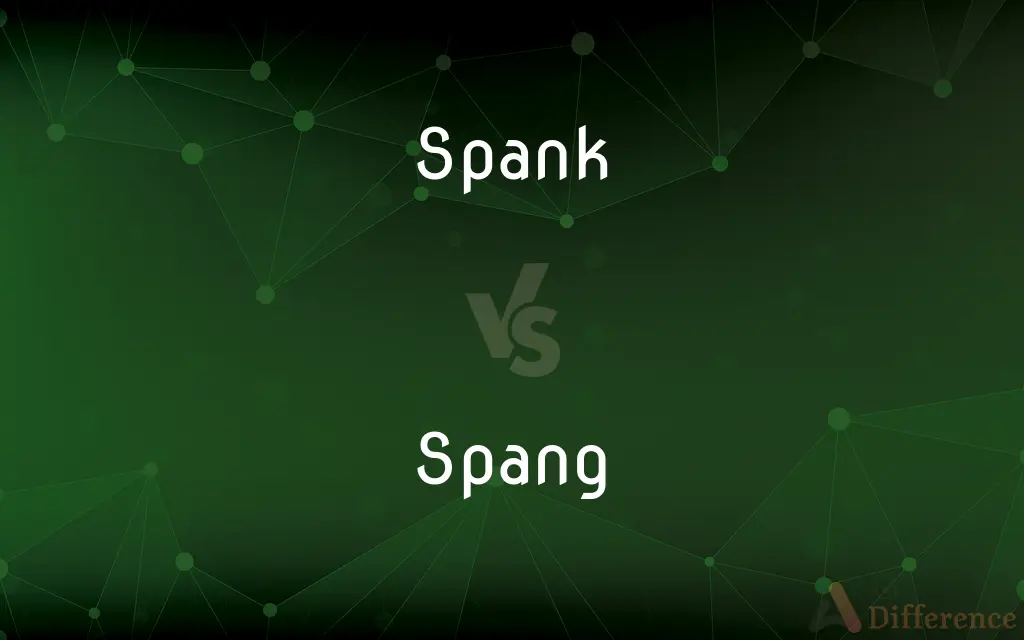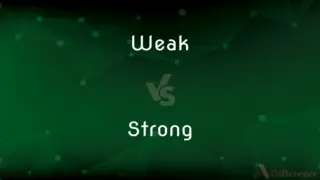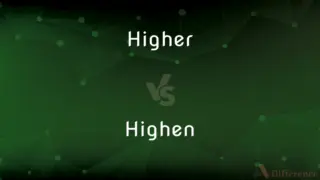Spank vs. Spang — What's the Difference?
By Fiza Rafique & Maham Liaqat — Updated on April 7, 2024
Spank refers to striking with the hand or an implement as punishment, emphasizing correction. Spang, an archaic or dialect term, means to spring or leap suddenly, highlighting movement.

Difference Between Spank and Spang
Table of Contents
ADVERTISEMENT
Key Differences
Spank is commonly understood as the act of slapping, typically on the buttocks, with an open hand or sometimes with an implement, used primarily as a form of punishment or discipline. This action is often associated with parental or educational discipline, aiming to correct behavior. On the other hand, spang, which is less commonly used in modern English, refers to a sudden movement, specifically a leap or jump, and is often used in a descriptive manner to illustrate quick or abrupt motion.
The context in which spank is used is predominantly disciplinary, reflecting social and cultural attitudes towards punishment and behavior correction. The term carries connotations of authority and reprimand, intended to deter undesirable actions or attitudes. Whereas spang, when used, paints a picture of agility or abruptness, capturing the essence of sudden motion without any disciplinary connotations.
Spank's relevance and acceptance have evolved over time, with varying perspectives on its appropriateness and effectiveness as a disciplinary method. In contrast, spang remains largely a literary or colloquial expression, with its usage more related to describing physical action rather than societal behavior.
The effectiveness and moral standpoint regarding spanking as a disciplinary measure are subjects of debate, reflecting broader discussions on parenting and educational methods. Spang, however, elicits no such controversy, being purely descriptive of motion and devoid of ethical implications.
Despite their phonetic similarity, spank and spang serve entirely different purposes in language, with the former embedded in discussions of discipline and morality, and the latter more aligned with descriptive storytelling or anecdotal narration.
ADVERTISEMENT
Comparison Chart
Definition
To slap, typically on the buttocks, as a form of punishment.
To spring or leap suddenly.
Usage Context
Disciplinary, corrective.
Descriptive, indicating sudden movement.
Connotations
Authority, discipline, punishment.
Quickness, agility, abruptness.
Relevance
Subject to cultural and social attitudes towards discipline.
Limited, often considered archaic or dialectical.
Ethical Discussions
Often debated in terms of appropriateness and effectiveness.
None, purely descriptive.
Compare with Definitions
Spank
To slap as a form of punishment.
The parent decided to spank the child for lying.
Spang
Often used in literary contexts.
In the novel, the hero spang across the chasm.
Spank
Involving the use of hand or implement for discipline.
The teacher no longer spanks students as punishment.
Spang
Describes a quick, abrupt movement.
He spang to his feet when he heard the alarm.
Spank
Aimed at correcting behavior.
Some believe spanking helps in instilling discipline.
Spang
To leap or jump suddenly.
The cat spang onto the windowsill in one fluid motion.
Spank
Reflects societal attitudes towards punishment.
Public opinion on spanking has shifted over the years.
Spang
Considered archaic or dialectal.
He spang up and ran, is a phrase one might find in older texts.
Spank
Associated with authority and control.
The nanny is against spanking as a form of discipline.
Spang
Indicates agility or suddenness.
With a spang, the rabbit escaped the fox.
Spank
To move briskly or spiritedly.
Spang
Spang is a village in Germany, north of Trier between Bitburg and Wittich. This village was first mentioned in 1254.
Spank
(transitive) To soundly defeat, to trounce.
Spang
Precisely; squarely
Fell spang into the middle of the puddle.
Spank
(transitive) To hit very hard.
Spang
(obsolete) A shiny ornament or object; a spangle
Spank
(intransitive) To move rapidly.
The ship was really spanking along.
Spang
(Scotland) A bound or spring; a leap.
Spank
An instance of spanking, separately or part of a multiple blows-beating; a smack, swat, or slap.
Spang
(Scotland) A span.
Spank
A slapping sound, as produced by spanking.
Spang
To set with bright points: star or spangle.
Spank
To strike, as the breech, with the open hand; to slap.
Spang
To hitch; fasten.
Spank
To move with a quick, lively step between a trot and gallop; to move quickly.
Spang
To strike or ricochet with a loud report
Spank
A blow with the open hand; a slap.
Spang
To leap; spring.
Spank
A slap with the flat of the hand
Spang
To cause to spring; set forcibly in motion; throw with violence.
Spank
Give a spanking to; subject to a spanking
Spang
(dated) Suddenly; slap, smack.
Spang
To spangle.
Spang
To spring; to bound; to leap.
But when they spang o'er reason's fence,We smart for't at our own expense.
Spang
A bound or spring.
Spang
A spangle or shining ornament.
With glittering spangs that did like stars appear.
Spang
Leap, jerk, bang;
Bullets spanged into the trees
Common Curiosities
What is the origin of the word "spang"?
"Spang" originates from the dialectal or archaic English, indicating a leap or bound, with its usage diminishing in contemporary language.
Are there ethical debates surrounding spank?
Yes, the use of spanking as a disciplinary measure is a topic of ethical and psychological debate, focusing on its effectiveness and impact on children.
What alternatives are suggested for spanking?
Alternatives to spanking often include non-physical forms of discipline, such as time-outs, verbal reprimands, and positive reinforcement strategies.
Does the use of spang in literature affect its understanding?
The literary use of spang can preserve its meaning and bring attention to its descriptive potential, despite being considered archaic.
Is spang still commonly used?
Spang is considered somewhat archaic or dialectal, primarily used in literary works or specific regional dialects to describe sudden movement.
Can spanking be part of educational discipline?
The use of spanking in educational settings varies widely, with many places now prohibiting it due to changing views on corporal punishment.
Can spang be used to describe any kind of movement?
Spang specifically describes a sudden or quick leap or jump, not just any movement.
Why might someone choose to use the word "spang" today?
Someone might use "spang" for stylistic reasons, to evoke a specific tone or to adhere to regional linguistic traditions.
Is spang considered formal or informal language?
Spang is neither distinctly formal nor informal but is noted for its archaic or dialectical usage.
What regions might still use the word "spang"?
Certain English-speaking regions with strong traditions of dialectical speech or those that cherish archaic language might still use "spang."
Can the context change the meaning of spank?
While "spank" primarily denotes discipline, its connotations can vary with context, especially considering the changing societal norms.
How has the public perception of spanking changed?
Public perception has shifted significantly, with increasing opposition to spanking due to concerns over its impact on child development and well-being.
How do cultural perspectives influence the use of spanking?
Cultural perspectives on child-rearing, discipline, and authority significantly influence attitudes towards and the practice of spanking.
What legal restrictions exist on spanking?
Many countries and regions have legal restrictions or outright bans on spanking, especially in schools and public institutions, reflecting a global shift towards non-physical discipline methods.
Share Your Discovery

Previous Comparison
Weak vs. Strong
Next Comparison
Higher vs. HighenAuthor Spotlight
Written by
Fiza RafiqueFiza Rafique is a skilled content writer at AskDifference.com, where she meticulously refines and enhances written pieces. Drawing from her vast editorial expertise, Fiza ensures clarity, accuracy, and precision in every article. Passionate about language, she continually seeks to elevate the quality of content for readers worldwide.
Co-written by
Maham Liaqat













































